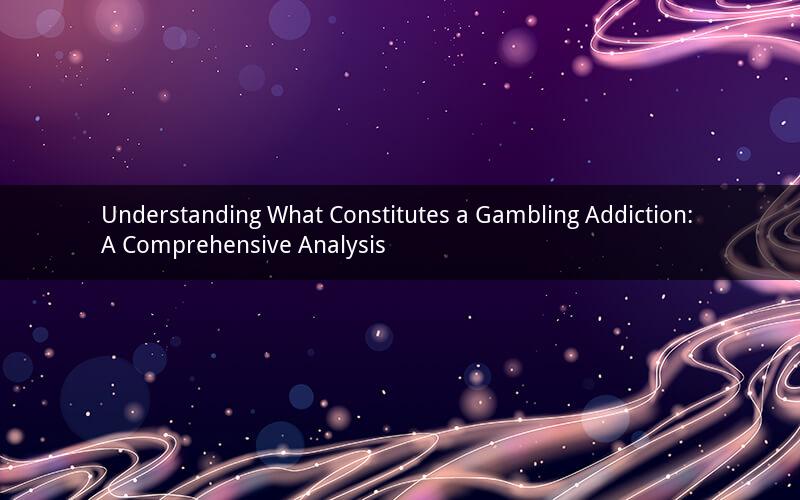
Gambling addiction, also known as problem gambling or compulsive gambling, is a serious condition that affects individuals, families, and society as a whole. Identifying what constitutes a gambling addiction is crucial for early intervention and treatment. This article delves into the definition, signs, and symptoms of gambling addiction, highlighting the factors that contribute to its development.
Definition of Gambling Addiction
Gambling addiction is characterized by an inability to control the urge to gamble, despite negative consequences. It is a form of addictive behavior that can lead to financial, emotional, and social problems. The Diagnostic and Statistical Manual of Mental Disorders (DSM-5) defines gambling addiction as a behavioral addiction, which is a pattern of gambling behavior that causes clinically significant distress or impairment in social, occupational, or other areas of functioning.
Signs and Symptoms of Gambling Addiction
1. Preoccupation with gambling: Individuals with gambling addiction often think about gambling constantly, even when they are not engaged in the activity. They may dream about gambling or find themselves preoccupied with thoughts of winning or losing money.
2. Inability to control gambling: Those struggling with gambling addiction may find it difficult to stop gambling, even when they know it is causing harm. They may continue to gamble despite financial, legal, or social problems.
3. Chasing losses: Gamblers with addiction may try to recoup their losses by gambling more, which often leads to even greater losses.
4. Lying or hiding gambling activities: Individuals with gambling addiction may lie to family, friends, or therapists about their gambling habits. They may also hide their gambling activities to avoid being caught or confronted.
5. Risking relationships, jobs, or health: Gambling addiction can lead individuals to prioritize gambling over their relationships, work, and health. This can result in job loss, strained relationships, and even physical health issues.
6. Relieving unpleasant feelings with gambling: Some individuals with gambling addiction turn to gambling as a means to cope with stress, anxiety, or depression. This can create a cycle of reliance on gambling to escape negative emotions.
Factors Contributing to the Development of Gambling Addiction
1. Genetic predisposition: Research suggests that genetics play a role in the development of gambling addiction. Individuals with a family history of addiction may be more susceptible to developing gambling addiction themselves.
2. Environmental factors: Exposure to gambling opportunities, such as casinos, online gambling sites, or even gambling-friendly communities, can increase the risk of developing gambling addiction.
3. Mental health disorders: Individuals with certain mental health conditions, such as depression, anxiety, or substance abuse disorders, may be more prone to developing gambling addiction as a means of coping with their symptoms.
4. Personality traits: Certain personality traits, such as impulsivity, thrill-seeking, and risk-taking behavior, can contribute to the development of gambling addiction.
5. Social factors: Social pressure, peer influence, and the desire to fit in with a certain group can also play a role in the development of gambling addiction.
Diagnosis and Treatment
Diagnosing gambling addiction involves assessing an individual's gambling behavior, history, and the impact it has on their life. Treatment for gambling addiction typically includes a combination of therapy, support groups, and, in some cases, medication.
1. Therapy: Cognitive-behavioral therapy (CBT) is a common form of therapy used to treat gambling addiction. CBT helps individuals recognize and change negative thoughts and behaviors associated with gambling.
2. Support groups: Support groups, such as Gamblers Anonymous, provide a safe space for individuals with gambling addiction to share their experiences and receive encouragement from others who have faced similar challenges.
3. Medication: In some cases, medication may be prescribed to help manage underlying mental health conditions that contribute to gambling addiction.
Conclusion
Understanding what constitutes a gambling addiction is essential for recognizing and addressing the issue. By identifying the signs and symptoms of gambling addiction and understanding the factors that contribute to its development, individuals, families, and professionals can take steps to prevent and treat this harmful condition.
1. What are the long-term consequences of gambling addiction?
Long-term consequences of gambling addiction may include financial ruin, strained relationships, job loss, legal problems, and even suicide.
2. Can someone with a gambling addiction recover?
Yes, recovery from gambling addiction is possible. Many individuals have overcome their addiction with the help of therapy, support groups, and a strong commitment to change.
3. How can I help someone with a gambling addiction?
You can help someone with a gambling addiction by offering support, encouraging them to seek professional help, and being patient during their recovery journey.
4. Are there any effective self-help strategies for gambling addiction?
Yes, some effective self-help strategies for gambling addiction include setting strict gambling limits, avoiding gambling triggers, and practicing mindfulness and stress management techniques.
5. What is the role of family in the recovery process for gambling addiction?
Family members play a crucial role in the recovery process for gambling addiction. They can provide emotional support, encourage the individual to seek help, and help create a supportive environment for their loved one's recovery.